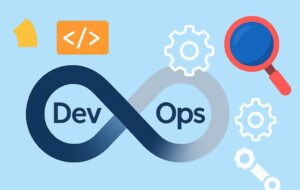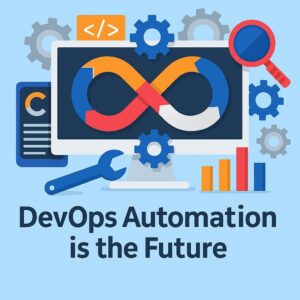DevOps automation serves as the very heart of contemporary software delivery. So, what actually is DevOps automation? Quite simply, it describes the use of tools and scripts to eliminate the manual tasks from the software development life cycle (SDLC). From writing code to testing, deploying, and monitoring, everything can be automated. For students and working professionals, this means less human error and more speed.

DevOps automation is required to make all interruptions, time-spent waiting and being disorganized irrelevant as the developer or IT teams produce coherent work, not waiting on each other. For example, in the morning, a developer can write code, and the next day, it goes live without requiring server touching or script revisiting. That is the magic of DevOps automation.
Why Does DevOps Automation Matter in Real Life?
Because the race is on, and speed is king. Why do you think everybody is talking about DevOps automation? In fact, with the fast-paced tech culture today, companies cannot afford to delay. DevOps automation improves the release cycle, enhances the environment to be stable with continuous delivery, and reduces bugs during the production period.
Let’s take an example: you write code, push it into GitHub, and something like Jenkins-an automation tool-actually picks it up by itself, does some testing, and deploys it live into your website. No more “it works on my machine” excuses. That’s the power of DevOps automation-it builds trust between development and operations.
Crucial Components of DevOps Automation
To actually know what it is DevOps automation, we have to tell the central parts of it:
- CI/CD Pipelines: These automate the testing and deployment of code changes.
- Infrastructure as code (IaC): Terraform is an example of tools that help automate the setup of servers and networks.
- Monitoring & Logging: Tools like Prometheus and ELK Stack automate error-tracking.
- Containerization: App deployment in portable containers is automated via Docker and Kubernetes.
This happens to be one building block of DevOps automation. And learning through such can dramatically better one’s reputation with tech roles and employability.
Advantages of Automation in DevOps
Let’s now go to the benefits that arise with automation in DevOps why should you care about all that?
- Faster Delivery – Manual testing or deployment should no longer delay companies in releasing their features.
- Consistency – Scripting in code; scripts won’t forget steps. People do.
- Better Quality – Automation finds bugs early on, thus eliminating the need for expensive rollbacks.
- Happier Teams – Developers will focus on building rather than fighting fires.
- Scalability – An increase occurs; automated systems adapt accordingly autonomously without manual intervention.
Thus, this shows why companies, be it startups or tech giants, are heavily investing resources in carrying out DevOps.
Most Preferred Tools Fueling DevOps Automation
DevOps automation is a subject of popular tools. Each of these tools takes part in building an automatic pipeline, such as
- Jenkins-you are talking about testing and deployment automation.
- GitHub Actions-automatic workflows affected by a commit to code.
- Ansible-automate infrastructure and configuration.
- Docker-packaging and deploying apps.
- Kubernetes-scaling and managing the processes in containers.
Being equipped with these tools, you’d be job-ready in less than 6 months. If you’re a new graduate or a career changer, it’s smart to invest in learning DevOps automation tools.
![]() Join Our Devops & Cloud Computing Telegram Channel
Join Our Devops & Cloud Computing Telegram Channel
![]() Join Our Devops & Cloud Computing WhatsApp Channel
Join Our Devops & Cloud Computing WhatsApp Channel
Learn DevOps Automation as a Beginner
It is not as hard to get started with DevOps Automation as people think. Try collecting and learning one tool at a time. For example:
- Learn Git and GitHub first, and figure out how versioning works.
- Next, use Jenkins and automate a simple build.
- Use Docker to package your app and run it anywhere.
- Experiment with Kubernetes for managing containers
There are numerous courses for beginners, but nothing beats hands-on practice. Set up a few of your own projects and try to automate them.
Real-life Example Cases of DevOps Automation
What is this thing that is really useful for DevOps automation in real-life jobs? Let’s find out.
- E-commerce: Automatically deploy on every code change.
- Banking apps: Auto-test every new feature to guarantee zero bugs.
- Streaming: Use automation to scale up servers during high traffic.
- Healthcare portals: Automated security checks for HIPAA compliance.
No area remains without using DevOps automation, not to mention improving reliability and customer experience. Learning it gives you an edge.
The Career Edge Brought About by DevOps Automation
It opens doors for students and working professionals alike. Some of these roles include:
- DevOps Engineer
- Site Reliability Engineer (SRE)
- Cloud Automation Engineer
- Release Manager
Each of these roles requires sound knowledge in DevOps automation. And the demand is skyrocketing, with many salaries starting with 8 LPA, going up to 35 LPA, and more in India.
DevOps Automation is the Future

DevOps automation is an important buzzword, it’s what links coding with operations. It helps the business innovate faster, keeps teams productive, and gives end-users a better experience. So you want to look into increasing your skill set; this should be your next step.
Also Read:
- DevOps Frameworks Explained: A Beginner Guide to Building Your Own in 2025
- DevOps Team Setup 101 – Explore Powerful Future of Tech
- DevOps Career Path: Your Career Guide For 2025
- How DevOps Works? Easy Explanation
Launch Your DevOps Career with PW Skills
Want to make your entry into DevOps without fluff? PW Skills’ DevOps course combines hands-on tools, real-world projects, and industry mentorship to kill the job readiness. Learn about automation tools like Jenkins, Docker, and Kubernetes without difficulty, even if you are a beginner. Start today to build the future of cloud and code with confidence.
Some basic scripting will help you, but lots of tools are GUI-based for automation. Come small and grow. Definitely! It's also applied in data science, testing, and cloud infrastructure. One can gain some basics in 2-3 months with daily practice and be job-ready within 6 months. Start with GitHub Actions, Jenkins, and Docker. They have large communities with tons of tutorials.DevOps Automation FAQs
Do you need to be a coder to learn DevOps automation?
Can DevOps automation be utilized outside software development?
How long does it take to learn DevOps automation tools?
Which DevOps automation tools are beginner-friendly?

